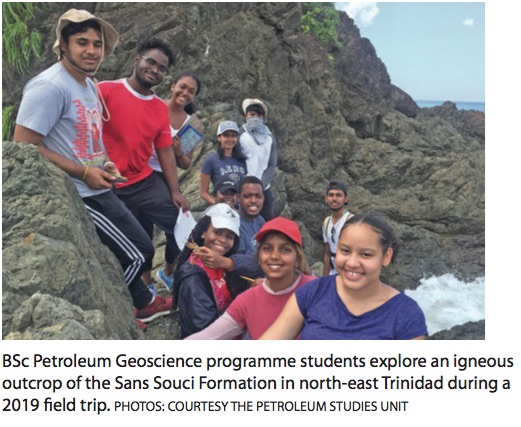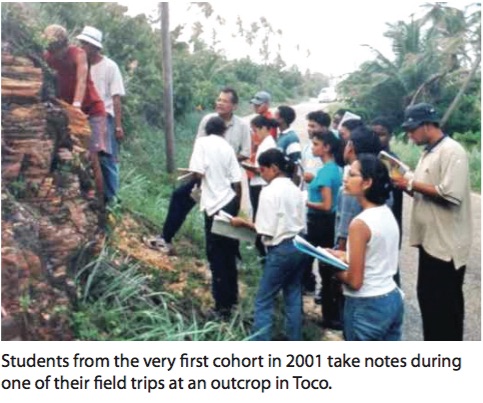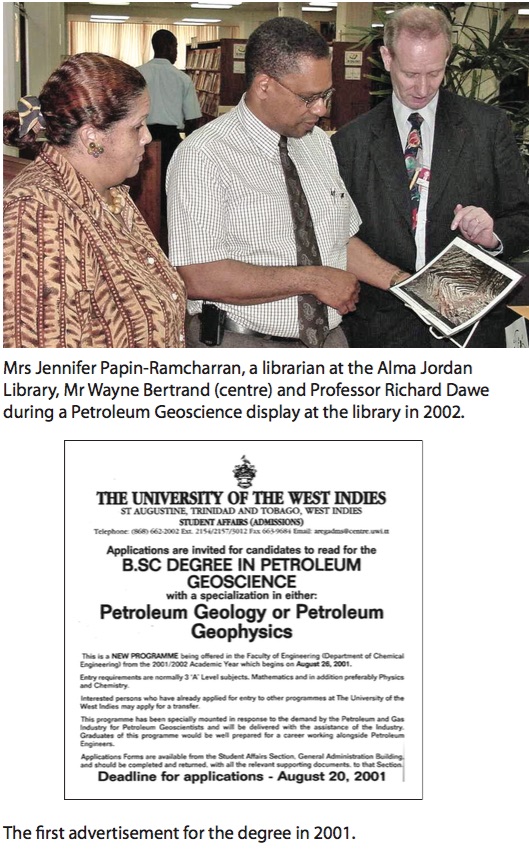Petroleum Geoscience programme celebrates its 20th Anniversary
Two decades ago, the Petroleum Geoscience programme was added to the list of offerings from the campus’ Petroleum Studies Unit, which is part of the Department of Chemical Engineering in the Faculty of Engineering. The Bachelor of Science (BSc) in Petroleum Geoscience is the only undergraduate programme that is offered by the unit, with its other three at the postgraduate level.

Dr Ryan Ramsook, Programme Coordinator of the Petroleum Geoscience and Senior Lecturer in the Petroleum Studies Unit, describes the discipline as a science that explores the earth’s crust in order to highlight areas of petroleum accumulation.
“It embraces the core aspects of the discipline of geology and geophysics together with an array of other sciences such as physics, chemistry, mathematics, biology, geology, engineering, environmental science, and economics,” says Dr Ramsook.
When asked about purpose of the programme, Professor Raffie Hosein, Head of the Department of Chemical Engineering and Professor of Petroleum Engineering, recalls the evolution of the local petroleum industry. He explains that in 1999, the local petroleum industry experienced industrial growth with the development of the LNG, methanol and ammonia exporting businesses. However, the community of petroleum geoscientists were slowly aging. This led to an increased demand for locally-developed graduates and professionals trained to the highest international standards of hydrocarbon exploration and production.
To address these industry needs, the undergraduate programme in Petroleum Geoscience was introduced at UWI St Augustine in September 2001. Its creation followed requests from the Geological Society of Trinidad and Tobago, the Government of Trinidad and Tobago, and major oil and gas companies, all of whom partnered for the development of this unique three-year course of study, and who continue to support financially and assist in its guidance today. Between 2001 and 2020, the programme conferred 196 degrees.
Both Dr Ramsook and Professor Hosein credit this continued partnership of academia, government and industry as one of the major advantages of the programme. They praise the benefits that it offers students – from having industry trained professionals as lecturers, to an active internship programme – which creates the type of graduate that companies desire.

Mr Amrit Cooblal, a Petroleum Geoscience graduate, remembers being in secondary school and developing a passion for engineering. Around that time, he also learned more about the oil and gas industry’s impact on the local economy. From there, he knew he wanted to be a part of the energy sector. The range of courses offered further increased his enthusiasm, and with The UWI’s international accreditation, he recognised that studying at the St Augustine Campus would facilitate his growth in the industry, regionally and internationally.
“It is a well-integrated programme,” Cooblal says, “that offers students insights into a multitude of petroleum related careers such as Geochemistry; Petrophysics; Palaeontology; Health, Safety and the Environment; Petroleum Economics; Petroleum Law; and Petroleum Engineering, just to name a few.”
When asked about his experience as a student, he recalls the camaraderie that he enjoyed with his classmates, their enjoyable field trips and late-night study sessions. He also praised the many opportunities for networking with industry professionals that he and his classmates benefitted from during their time of study.

Current student, Ms Kerneese Ramjarrie praises the dedicated lecturers who go above and beyond to ensure that their learning experience is engaging.
Her interest in petroleum engineering started with her upbringing in the rural community of Navet Village in Rio Claro. While many of her friends spent time online, her explorations took her outside. She developed an interest in rocks and created her first rock collection.
This hobby, combined with her exposure to subjects such as chemistry and physics, led her to Petroleum Geoscience. Ramjarrie is currently completing her final year and intends to move on to the Master of Science in Petroleum Engineering on a part-time basis while she works to gain experience. She hopes to one day pursue a PhD, and sees herself both lecturing and employed in the industry.
While those who have experienced the programme praise it, there are challenges. Global economic conditions have led to declines in financial support. However, partners such as the Ministry of Energy and Energy Industries have stepped up and increased their assistance. The energy sector has also been affected by the COVID-19 pandemic, leading to a reduction of internships. Still, staff, students, and graduates are hopeful for the future.
Professor Hosein says the programme is being revised to offer more options and flexibility to students, all with the aim of bettering their learning experience and increasing job opportunities. Dr Ramsook speaks of research in conventional, unconventional and alternative energy sources when he looks at the programme’s future, incorporating applied research projects with industry partners and government institutions, and collaborating with other universities. Both Cooblal and Ramjarrie speak about the need for the inclusion of alternative, sustainable and renewable energy sources in the curriculum, given the global move towards greener industries.
When asked about the future of the programme, Professor Andrew Jupiter, Coordinator of the Petroleum Studies Unit, had this to say:
“Moving forward, the programme will be amended to reflect the energy transition that is taking place in the world and definitely in Trinidad and Tobago. It will be changed to a four-year programme with an option to graduate with a master’s degree in the fourth year. The final year will focus on different options reflecting the transition from fossil fuel to renewables. A graduate should reflect entrepreneurship and innovation in all disciplines of geology.”
